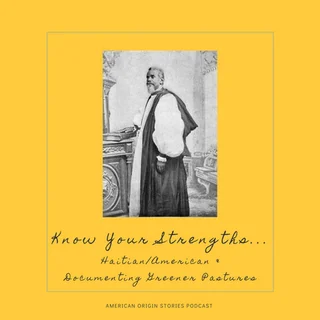get these nets
Veteran
.png)
American Origin Stories is a podcast about our journey discovering lost ancestry, identity, and cultural connection. Host Chauneice Davis Yeagley is a lawyer, writer, and storyteller.
Ep 9 is 28 minutes long
EP 9: Know Your Strengths - Haitian/American & Documenting Greener Pastures
May 21, 2020

Episode 9: Know Your Strengths - Haitian/American & Documenting Greener Pastures
When tracing your ancestry, it’s important to know your strengths. Each of us has a unique set of skills that can be put to use when exploring our family history. Today, we will discuss how one woman did just that and learned so much about herself & her identity in the process.
Building on last week’s episode, we'll discuss the implications of slavery outside of the United States. We previously explored the ways that Haiti’s feat of becoming the first Black Republic influenced Blacks in the diaspora; the glorious battle for freedom and independence ignited conversation about Black people everywhere.
Our previous guest, historian Dr. Brandon Byrd discussed the ways in which Haiti, as an ideal, shaped the imagination on what freedom could look like for Black people as a whole. And, Blacks began to contemplate Black Internationalism in a real way. Specifically, Black Americans traveled to other countries, including Haiti, to find reprieve from American racism & oppression.
Yet despite Haiti’s accomplishment and impact on the dreams of enslaved and newly freed people - over time, relations between Black Americans and Haitians became strained.
Our guest today, Natalie Claire Holly knows all too well the impact of that strain. In fact, she is the human story embodying so many of the academic themes discussed in Dr. Byrd’s research.

Through her work as a filmmaker, she learned of her great(x3) grandfather's legacy as an American and as a Haitian:
James Theodore Holly (1829-1911)

First Black American bishop in the Episcopal Church.
Bishop Holly was born free on October 3, 1829 in Washington D.C., and he came from a family of formerly enslaved Black Americans. During his adolescents, Bishop Holly was trained in the craft of boot-making and he also received a private education. But, as is often the result of educating the oppressed, the more he learned, the more he realized the social constraints placed on his freedom.
In an attempt to escape this oppression, he and his family moved further and further North (going all the way to Canada), assuming that racism was rooted in the American South. He quickly realized the flaw in his logic—racial oppression would exist anywhere that black people were not considered free and equal citizens. So he decided to seek greener pastures in a land where black people had been free for decades - The Black Republic.
To learn more about his journey across the sea with 101 black women, men, and children, tune into Episode 8 of the American Origin Stories podcast
Last edited: